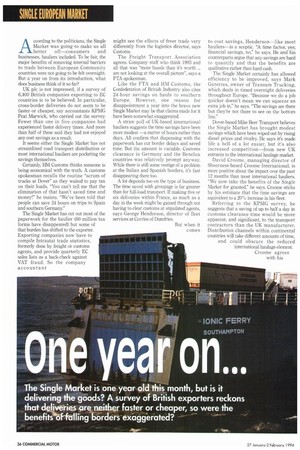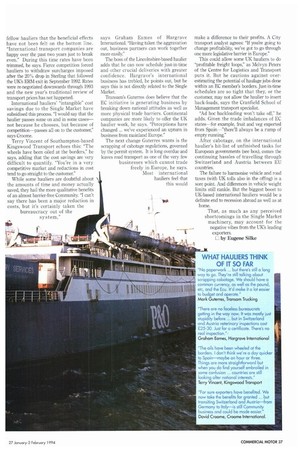The Single Market is one year old this month, but
Page 38

Page 39

If you've noticed an error in this article please click here to report it so we can fix it.
is it delivering the goods? A survey of British exporters reckons that deliveries are neither faster or cheaper, so were the benefits'of falling borders exaggerated?
According to the politicians, the Single Market was going to make us all better off—consumers and businesses, hauliers included. To be fair, the major benefits of removing internal barriers to trade between European Community countries were not going to be felt overnight. But a year on from its introduction, what does business think of it so far?
UK plc is not impressed, if a survey of 6,400 British companies exporting to EC countries is to be believed. In particular, cross-border deliveries do not seem to be faster or cheaper, say accountants KPMG Peat Marwick, who carried out the survey. Fewer than one in five companies had experienced faster delivery times. And more than half of these said they had not enjoyed any cost savings as a result It seems either the Single Market has not streamlined road transport distribution or most international hauliers are pocketing the savings themselves.
Certainly, HM Customs thinks someone is being economical with the truth. A customs spokesman recalls the routine "scrum of trucks at Dover" as they waited to pay tax on their loads. You can't tell me that the elimination of that hasn't saved time and money!" he insists. "We've been told that people can save 24 hours on trips to Spain and southern Germany."
The Single Market has cut out most of the paperwork for the haulier (60 million tax forms have disappeared) but some of that burden has shifted to the exporter. Exporting companies now have to compile Intrastat trade statistics, formerly done by freight or customs agents, and provide quarterly EC sales lists as a back-check against VAT fraud. So the company accountant might see the effects of freer trade very differently from the logistics director, says Customs.
The Freight Transport Association agrees. Company staff who think 1993 and all that was "more hassle than it's worth ... are not looking at the overall picture", says a ETA spokesman.
Like the FTA and HM Customs, the Confederation of British Industry also cites 24-hour savings on hauls to southern Europe. However, one reason for disappointment a year into the brave new Single Market may be that claims made for it have been somewhat exaggerated.
A straw poll of UK-based international hauliers suggests the time savings have been more modest —a matter of hours rather than days. All confirm that dispensing with the paperwork has cut border delays and saved time. But the amount is variable. Customs clearance in Germany and the Benelux countries was relatively prompt anyway. While there is still some vestige of a problem at the Italian and Spanish borders, it's fast disappearing there too.
A lot depends too on the type of business. The time saved with groupage is far greater than for full-load transport. If making five or six deliveries within France, as much as a day in the week might be gained through not having to clear customs at stipulated agents, says George Henderson, director of fleet services at Curries of Dumfries.
But when it comes to cost savings, Henderson—like most hauliers—is a sceptic. "A time factor, yes; financial savings, no," he says. He and his counterparts argue that any savings are hard to quantify and that the benefits are qualitative rather than hard cash.
The Single Market certainly has allowed efficiency to be improved, says Mark Guterres, owner of Transam Trucking, which deals in timed overnight deliveries throughout Europe. "Because we do a job quicker doesn't mean we can squeeze an extra job in," he says. "The savings are there but they're not there to see on the bottom line."
Dover-based Mike Beer Transport believes the Single Market has brought modest savings which have been wiped out by rising diesel prices and rivalry. He says it's made life a hell of a lot easier, but it's also increased competition—from new UK entrants to the international haulage market. David Croome, managing director of Sheerness-based Croome International, is more positive about the impact over the past 12 months than most international hauliers. We now take the benefits of the Single Market for granted," he says. Croome sticks by his estimate that the time savings are equivalent to a 2004) increase in his fleet. Referring to the KPMG survey, he suggests that a saving of up to half a day in customs clearance time would be more apparent, and significant, to the transport contractors than the UK manufacturer. Distribution channels within continental countries will take different amounts of time,
and could obscure the reduced international haulage element.
Croome agrees with his fellow hauliers that the beneficial effects have not been felt on the bottom line. "International transport companies are happy over the past two years just to break even." During this time rates have been trimmed, he says. Fierce competition forced hauliers to withdraw surcharges imposed after the 20% drop in Sterling that followed the UK's ERM exit in September 1992. Rates were re-negotiated downwards through 1993 and the new year's traditional review of transport prices has not happened.
International hauliers' "intangible" cost savings due to the Single Market have subsidised this process. "I would say that the haulier passes some on and in some cases— not because he chooses, but because of competition—passes all on to the customer," says Croome.
Terry Vincent of Southampton-based Kingswood Transport echoes this: "The wheels have been oiled at the borders," he says, adding that the cost savings are very difficult to quantify. "You're in a very competitive market and reductions in cost tend to go straight to the customer."
While some hauliers are doubtful about the amounts of time and money actually saved, they hail the more qualitative benefits of an almost barrier-free Community I can't say there has been a major reduction in costs, but it's certainly taken the bureaucracy out of the system," says Graham Eames of Hargrave International, "Having taken the aggravation out, business partners can work together more easily."
The boss of the Lincolnshire-based haulier adds that he can now schedule just-in-time and other crucial deliveries with greater confidence. Hargraves international business has trebled, he points out, but he says this is not directly related to the Single Market.
Transom's Guterres does believe that the EC initiative is generating business by breaking down national attitudes as well as more physical trade barriers. Continental companies are more likely to offer the UK haulier work, he says. "Perceptions have changed we've experienced an upturn in business from mainland Europe."
The next change Guterres wants is the scrapping of cabotage regulations, governed by the permit system. It is long overdue and leaves road transport as one of the very few businesses which cannot trade freely in Europe, he says. Most international hauliers feel that this would make a difference to their profits. A City transport analyst agrees: "If you're going to change profitability, we've got to go through one more legislative barrier in Europe."
This could allow some UK hauliers to do "profitable freight loops," as Melvyn Peters of the Centre for Logistics and Transport puts it. But he cautions against overestimating the potential of haulage jobs done within an EC member's borders. Just-in-time schedules are so tight that they, or the customer, may not allow the haulier to insert back-loads, says the Cranfield School of Management transport specialist.
"Ad hoc backloading won't take off," he adds. Given the trade imbalances of EC states—for example, fruit and veg exported from Spain—"there'll always be a rump of empty running," After cabotage, on the international haulier's hit-list of unfinished tasks for European governments (see box), comes the continuing hassles of travelling through Switzerland and Austria between EU countries.
The failure to harmonise vehicle and road taxes (with UK tolls also in the offing) is a sore point. And differences in vehicle weight limits still rankle. But the biggest boost to UK-based international hauliers would be a definite end to recession abroad as well as at home.
That, as much as any perceived shortcomings in the Single Market machinery, may account for the negative vibes from the UK's leading exporters.
E by Eugene SiIke




















































































